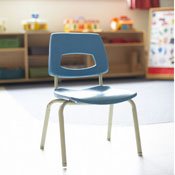Black students are twice as likely to get out-of-school suspensions and in some school districts, middle schools are three times more likely to suspend black boys, a new Southern Poverty Law Center study found.
Jackson Public Schools was one of the 18 urban school districts included in "Suspended Education: Urban Middle Schools in Crisis," by Daniel J. Losen and Russell J. Skiba.
The study, released last month, chose 18 of the nation's largest school districts to determine middle- school disciplinary practices in large urban districts. That picture shows that since the mid-1970s, suspensions for all students have risen dramatically. During the past decade, black students got suspended more often than whites. The racial gap got wider, also.
Jackson Public Schools officials don't dispute that minority students are overrepresented in discipline figures nationwide, but point out that student population at JPS is 98 percent black.
In 2006, the study found that in JPS black males had a 29 percent "risk of suspension" while white females had a 18 percent risk. Jackson's 11-point gap between the highest risk group (black males) and the lowest group (white females) was the lowest gap reported. The highest gap of 47 points was Palm Beach, Fla., where black males had a 53 percent risk of suspension while white females had a 6 percent risk.
"We pay special attention to racial disparity in suspensions," said Paula Van Every, director of the Safe Schools Healthy Students program at JPS.
The district is currently in the second year of the program funded by a $1.2 million federal grant, that provides training for teachers and extra personnel, such as counselors. It's collaborative program, including the city of Jackson, the Jackson Police and Hinds Behavioral Health Services. Van Every says a big emphasis of the program is keeping kids in school.
"If they are not in school, they can't be taught," she said. "Teaching kids how to solve problems themselves is more effective than sending them home for not being able to solve problems."
The program also helps to reduce the dropout rate, a high priority issue for JPS Superintendent Lonnie J. Edwards.
Van Every says the proactive approach is working although the district is still analyzing numbers at each school. In general, the number of suspensions are down, the number of expulsions are down and the number of days an individual student is suspended are also down.
"We know we are on the right track," Van Every said.
While there's no evidence that removing misbehaving students improves school safety or student behavior, a there is evidence showing that middle school suspensions may have significant long-term repercussions on students, the SPLC study reports.


